System Storage Benchmarks
For our SSD comparisons, we are comparing similar PCIe Gen5 x4 NVMe SSDs in this performance tier; all the SSDS on the graph are PCI-Express 5.0 x4 NVMe SSDs. Notably, the ADATA LEGEND 970 PRO utilizes the same Innogrit IG5666 controller as the TEAMGROUP T-FORCE GE PRO AirFlow I 2TB, and will be the primary performance comparison with which to compare with.
3DMark
We are using 3DMark’s Storage Benchmark which tests common gaming workload traces. The benchmark tests loading Battlefield V, Call of Duty Black Ops 4, and Overwatch. It tests moving games by copying a Steam folder for CS:GO, and installing Outer Worlds from the Epic Games Launcher, and saving game progress in The Outer Worlds. It tests recording a 1080p gameplay video at 60FPS with OBS while playing Overwatch. We will graph the Overall Benchmark Score, higher is better.
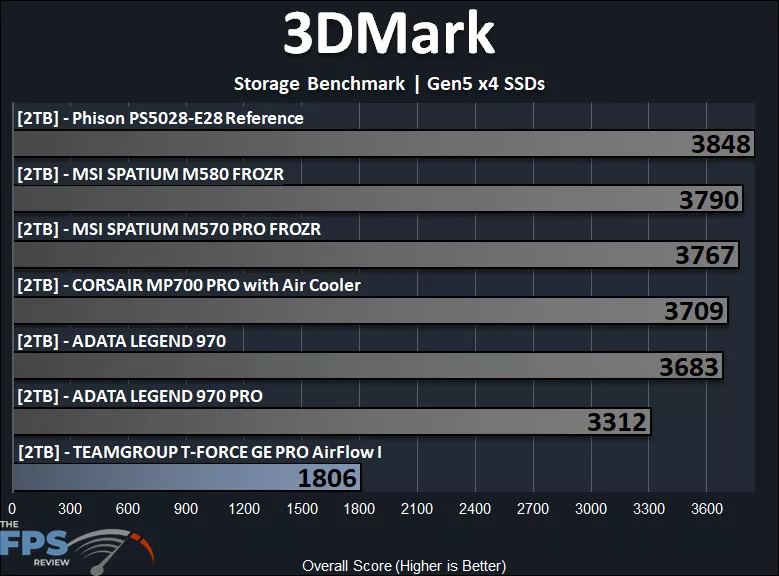
In all of our benchmarks to follow, you’ll want to keep an eye on how the TEAMGROUP T-FORCE GE PRO AirFlow I 2TB compares to the ADATA LEGEND 970 PRO, because both utilize the Innogrit IG5666 controller, and both are nearly rated at the same sequential read and write performance.
In 3DMark’s storage benchmark, the TEAMGROUP T-FORCE GE PRO AirFlow I 2TB seems to have encountered a problem with this specific benchmark, resulting in a very low performance. This performance is not typical for all of the other tests, so there is simply something very specific to this benchmark that is holding back the TEAMGROUP T-FORCE GE PRO AirFlow I 2TB, perhaps a firmware issue. The ADATA LEGEND 970 PRO did not experience this issue and performs better, though on the lower end of performance. We’d expect that if the TEAMGROUP T-FORCE GE PRO AirFlow I 2TB was performing correctly in this benchmark, it would be at, or slightly above, the ADATA LEGEND 970 PRO results, which would be consistent with the rest of the benchmark results you will see in this review.
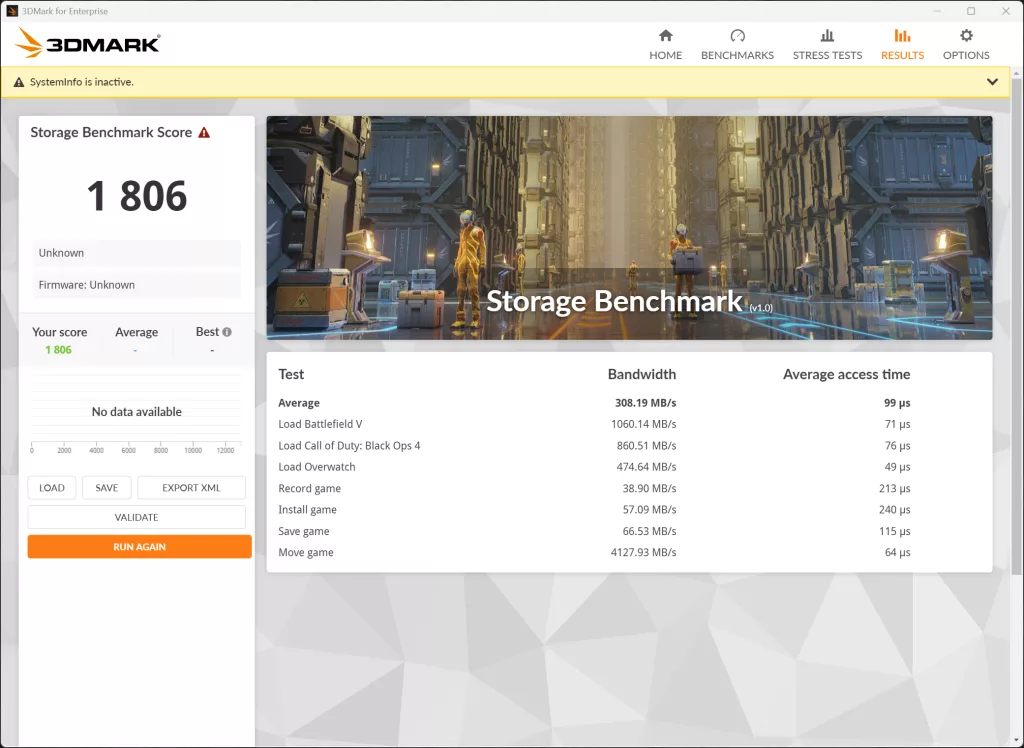
Drilling further into the 3DMark storage results, it looks like the problem benchmarks were the Record game, Install game, and Save game benchmark components of the test. These resulted in lower bandwidth and very high average access times, resulting in the overall low score. The ADATA LEGEND 970 PRO had much higher bandwidth and better access time in those results. However, for the other bandwidth results, the actual bandwidth was higher on the TEAMGROUP T-FORCE GE PRO AirFlow I 2TB compared to the ADATA LEGEND 970 PRO, so there is a specific issue there with those three components. Perhaps a firmware update could fix those results, but let’s look at the other benchmarks.
PCMark 10
We are using PCMark 10’s Full System Drive Storage Benchmark. It outputs an overall score (higher is better) that is derived from the Bandwidth (higher is better) as well as access time (lower is better) results.
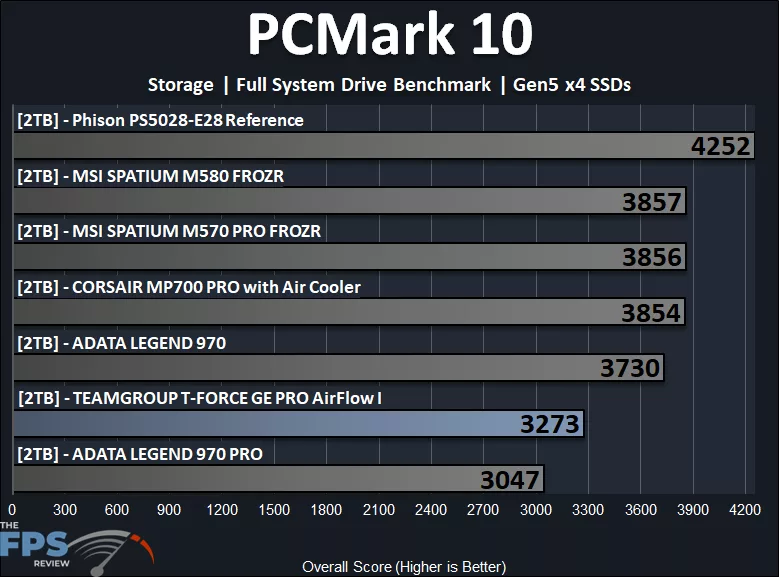
In PCMark 10’s full system drive storage benchmark, the TEAMGROUP T-FORCE GE PRO AirFlow I 2TB scored an overall result of 3,273, which puts it 7% above the ADATA LEGEND 970 PRO, which uses the same controller and has the same rated speeds. This is good news for the TEAMGROUP T-FORCE GE PRO AirFlow I 2TB, it is able to outperform the ADATA LEGEND 970 PRO, which is very similar in spec. Compared to the other Gen5 SSDs on this graph, however, it is in the lower range of performance comparatively. This seems to be par for the course for the Innogrit controller.
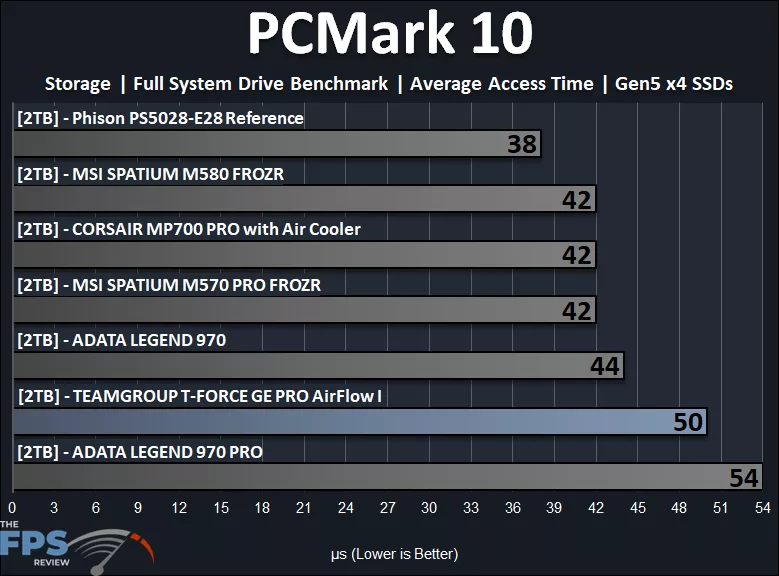
The average access time test in PCMark 10’s Storage Benchmark shows you a closer look at where things line up. This graph shows why the TEAMGROUP T-FORCE GE PRO AirFlow I 2TB places a bit lower in PCMark 10; the access time is 50. On the plus side, it is faster and better than the ADATA LEGEND 970 PRO, showing an improvement in the access time utilizing the same controller. However, it is on the lower side overall, with the average being in the lower 40s for the faster drives.
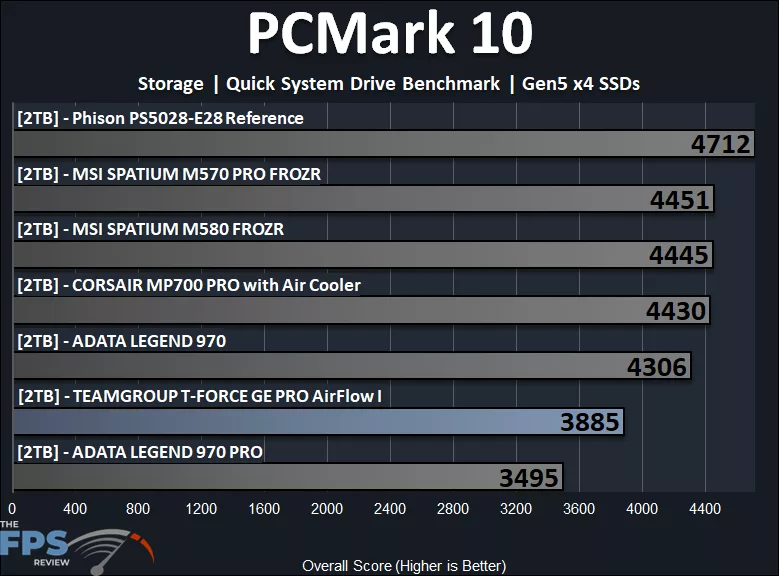
PCMark 10’s quick system drive storage benchmark focuses on smaller workloads, and typically, this is where we see the benefit of a DRAM cache. Compared to the ADATA LEGEND 970 PRO, the TEAMGROUP T-FORCE GE PRO AirFlow I 2TB is no slouch; it’s actually very good, performing 11% faster than the ADATA LEGEND 970 PRO, this is a very good result considering both SSDs use the same controller. The TEAMGROUP T-FORCE GE PRO AirFlow I 2TB seems to be more well optimized for smaller workloads, and that DRAM cache is helping out for sure.
PassMark PerformanceTEST
We are using PassMark’s PerformanceTEST Disk Mark benchmark only. This test benchmarks Disk Sequential Read, Disk Sequential Write, IOPS 32KQD20, IOPS 4KQD1 tests, and outputs an overall score (higher is better.)
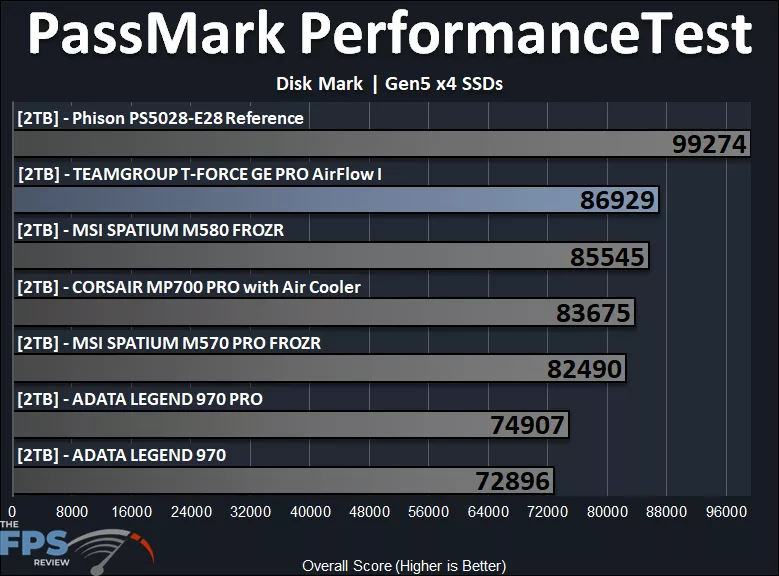
In PassMark PerformanceTest Disk Mark, this benchmark takes everything into consideration, including small workloads, large workloads, access time, and DRAM cache. Surprisingly, in this benchmark, the TEAMGROUP T-FORCE GE PRO AirFlow I 2TB is actually near the top of performance, most likely greatly benefited by that DRAM cache. Compared to the ADATA LEGEND 970 PRO, the TEAMGROUP T-FORCE GE PRO AirFlow I 2TB is 16% faster, which is quite a deal faster. According to this benchmark, overall, the TEAMGROUP T-FORCE GE PRO AirFlow I 2TB is a great performer when all things are considered.
